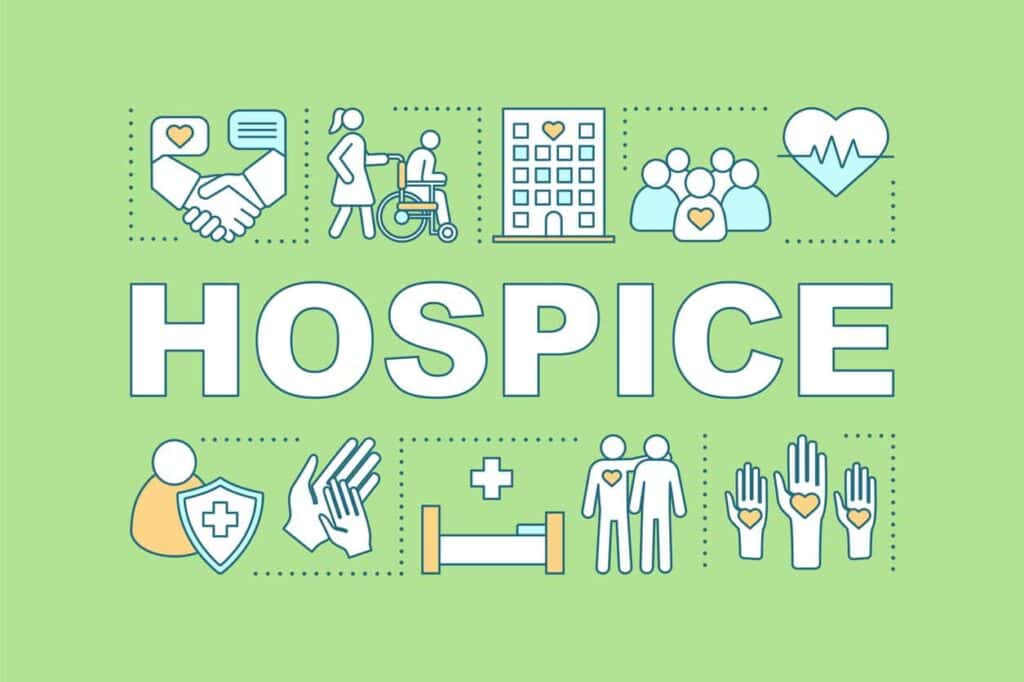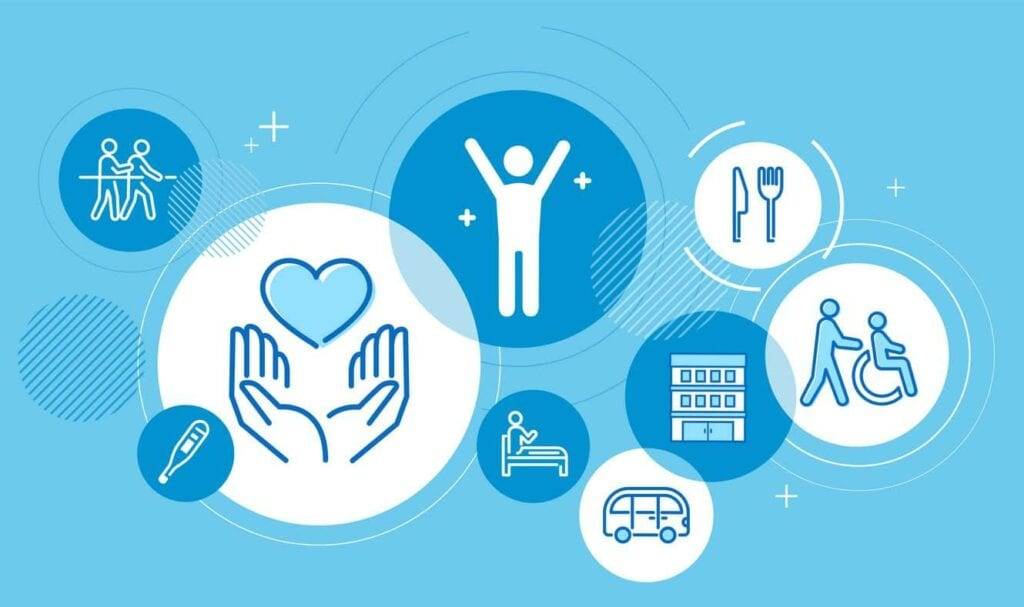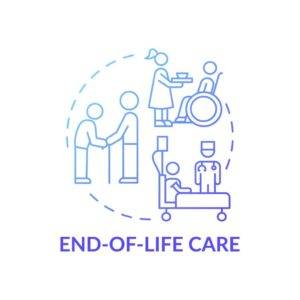
Ever wondered what hospice care really is? You’re not alone! It’s a term many of us hear, but don’t fully understand. Let’s clear up the confusion together!
In this article, we’re going to unpack what hospice care involves, who it’s for, and how it helps people and their families during tough times. Let’s get started to take a closer look at Hospice Definition!
What Does Being in Hospice Mean?
Being in hospice means receiving specialized care designed to enhance comfort and quality of life during the final stages of a serious illness. Hospice care shifts the focus from curative treatments to palliative care. Its main goal is managing symptoms and providing support, rather than trying to cure the illness. This type of care is intended for patients who are in the last six months or less of their life.
You can access hospice care at home, in assisted living homes, nursing homes, hospice facilities, or even hospitals. The approach is holistic, addressing not just the physical pain, but also the emotional and spiritual needs of patients and their families.
The care team typically includes doctors, nurses, caregivers, social workers, and chaplains, all coordinated to support the patient’s and family’s unique needs.
What Does Hospice Mean in Medical Terms?
In medical terms, hospice is care that focuses on the palliation of a terminally ill patient’s symptoms. These symptoms can be physical, emotional, or spiritual. Hospice care aims to treat these symptoms without attempting to cure the underlying illness, emphasizing quality of life over length of life.
What is the Purpose of Hospice?
Hospice aims to ensure that patients spend their final days with dignity and as little discomfort as possible. Here we have enlisted a few aims of hospice:
- Pain Management and Comfort: Provide treatments that alleviate symptoms and reduce pain.
- Emotional and Spiritual Guidance: Offer counseling and spiritual support to help patients and their families deal with the psychological aspects of end-of-life.
- Support for Caregivers: Educate and aid family members in caring for the patient, and provide respite when needed.
Goals of Hospice Care
The overarching goals of hospice care revolve around improving the quality of life for the patient and easing the emotional strain on their loved ones:
- Enhance Quality of Life: Tailored care options to improve the patient’s remaining days.
- Support and Education for Families: Assist families in understanding end-of-life processes and their roles in care, and provide necessary emotional support.
- Respect the Patient’s Wishes: Ensure that care aligns with the patient’s desires, focusing on comfort and personal preferences.
What Does Hospice Care Provide?

There is a wide range of services, hospice provides to support individuals nearing the end of their lives. These services mainly focus on comfort rather than curing an illness. Here’s a look at what hospice services typically include:
- Pain Management: The care team works to reduce pain and other distressing symptoms to improve the quality of life.
- Emotional Support: Hospice provides spiritual care to help patients and families cope with the emotional strains of terminal illness.
- Medical Equipment: Necessary medical equipment and supplies are provided to ensure comfort at home or in a hospice facility.
- Medication for Symptom Control: Medications are supplied to manage symptoms effectively, focusing on the patient’s comfort.
- Personal Care Assistance: Home health aides assist with daily activities such as bathing, dressing, and other personal care needs.
- Caregiver Support: Education and respite care are offered to help caregivers manage their duties and reduce stress.
- Social Work Services: Social workers support patients and families with counseling and help in navigating healthcare decisions.
Types of Hospice Facilities and Settings
Hospice care can be provided in several settings, depending on the needs of the patient and the family’s preferences. Each setting aims to ensure the highest quality of life as they near the end of life.
- Home Care: Most patients receive hospice care at home, where care is delivered in a familiar setting, allowing families to stay together.
- Hospice Centers: These are facilities specifically designed for hospice care, providing a peaceful, home-like environment tailored to end-of-life care needs.
- Hospitals: Hospice care in hospital consists of hospice units where patients receive acute symptom management in a clinical setting.
- Nursing Homes and Long-Term Care Facilities: Hospice services can also be integrated into nursing homes, offering specialized care alongside long-term residential services.
- Inpatient Care Facilities: For more complex health needs, inpatient facilities provide intensive care and symptom management that cannot be adequately handled at home.
What is Hospice Home Care?

Hospice home care is a type of care delivered at home for patients nearing the end of their lives. The patient doesn’t have to go anywhere.
Benefits of Receiving Hospice Care at Home
- Comfort in Familiar Surroundings: Patients receive care in the comfort of their own homes, surrounded by loved ones and a familiar environment.
- Personalized Care: The hospice care team tailors treatments and support to the patient’s preferences.
- Family Support: Families receive guidance and help from professionals to care for their loved ones effectively and cope with their emotional challenges.
- Reduced Costs: In-home hospice care reduces the cost of care compared to hospital or nursing home stays.
- Flexibility: Home care allows for more personal time with family and flexible visiting hours, making it easier for loved ones to be together.
- Holistic Support: The team addresses not just the physical symptoms but also the emotional and spiritual needs of patients.
- Enhanced Quality of Life: By focusing on comfort and reducing pain, hospice home care helps improve the patient’s quality of life in their final months.
- Access to 24/7 Support: Hospice teams are available around the clock to provide care and answer any questions the family might have.
Hospice home care offers a compassionate way to receive medical and emotional support during a crucial stage of life, ensuring patients live their final days with dignity and as little discomfort as possible.
Hospice Team

The hospice team consists of various healthcare professionals who collaboratively ensure that all aspects of a patient’s care are addressed. Each member plays a specific role, contributing their expertise to manage the patient’s physical and emotional well-being.
- Physician: Leads the team by overseeing the patient’s medical care, managing pain and symptoms, and coordinating treatments with other team members.
- Nurse: Provides hands-on care, educates the family on what to expect, and adjusts care plans as needed.
- Social Worker: Offers emotional and psychological support, assists with logistical arrangements, and helps families navigate healthcare decisions.
- Chaplain: Supports spiritual needs, offering comfort and facilitating religious or spiritual practices according to the patient’s beliefs.
- Caregiver: Helps with daily living activities, ensuring the patient’s comfort and maintaining their dignity.
- Volunteers: Provide companionship, help with non-medical tasks, and give family members a respite from caregiving duties.
- Bereavement Counselor: Prepares families for the passing of their loved one and provides support to cope with grief post-death.
Importance of Team Collaboration and Communication
Effective collaboration and communication within the hospice care team are crucial for providing holistic care:
- Enhanced Care Quality: Frequent communication and team meetings ensure that each member is updated on the patient’s condition and care plan, leading to timely and appropriate interventions.
- Comprehensive Support: By sharing knowledge and strategies, team members can offer more comprehensive support that addresses all aspects of the patient’s needs, from medical to emotional.
- Relief for Families and Caregivers: A coordinated team approach helps alleviate the burden on families and caregivers, providing them with guidance, support, and time to rest.
This multidisciplinary approach ensures that the care provided is both thorough and compassionate, catering to the unique needs of each patient and their family.
Hospice vs. Palliative Care

Although these terms are often used interchangeably, their scope of service is quite different. Let’s take a closer look at how hospice care differs from palliative care:
| Feature | Hospice Care | Palliative Care |
|---|---|---|
| Definition | Care for the terminally ill with a life expectancy of 6 months or less. | Care for those with serious illnesses, regardless of the disease stage. |
| Timing | Starts when curative treatment is no longer pursued. | Can begin at diagnosis and continue with curative treatment. |
| Goal | Comfort and quality of life for the remaining days. | Improve the quality of life by managing symptoms. |
| Care Focus | Palliative care only, no curative treatment. | Symptom management may include curative treatments. |
| Duration | The last six months of life typically. | Throughout the illness. |
| Care Setting | Home, hospice centers, hospitals, nursing homes | Hospitals, clinics, homes, and nursing homes. |
| Team | Doctors, nurses, social workers, spiritual advisors, volunteers. | Doctors, nurses, and specialists, integrate with other doctors. |
| Medicare Benefit | Covered under Medicare, Medicaid, and most insurances as a specific benefit. | Typically covered by healthcare plans; varies by plan. |
Eligibility and Coverage

Getting a clear understanding of the eligibility and coverage of hospice care can help you plan better for end-of-life care for your loved one.
Eligibility for Hospice Care
Here’s a simple breakdown of a few important eligibility criteria for hospice care:
- Terminal Illness: Hospice care is for patients diagnosed with a terminal illness with a prognosis of six months or less to live if the disease follows its normal course.
- Physician Certification: Two physicians, including the patient’s attending doctor, must certify the patient’s life expectancy.
- Consent: Patients must choose hospice care over treatments aimed at curing their illness. This decision involves opting for comfort care instead.
Coverage for Hospice Services
If you’re considering insurance coverage options for hospice care, you can look into:
- Medicare: The Medicare Hospice Benefit covers all hospice services related to the terminal diagnosis. This includes doctor services, nursing care, medical equipment, prescriptions for symptom control, home health aide services, and more.
- Medicaid: Most states offer hospice coverage under Medicaid with benefits similar to Medicare.
- Private Insurance: Many private health insurance providers also cover hospice care. Coverage details can vary, so checking the specific policy is important.
- No Out-of-Pocket Costs: Typically, there are no out-of-pocket costs for hospice care under Medicare. Families may only need to pay a small copayment for prescription drugs and respite care.
Choosing Hospice Care

When you consider hospice care for your elderly loved ones, it’s important to make the right choice. It focuses on comfort and quality of life at the end stage of an illness. Here are some key factors to consider when choosing hospice care for your loved ones:
- Patient’s Needs: Assess the specific care needs and the kind of support the patient requires at the end of life.
- Care Provider Reputation: Look for hospice providers known for compassionate and effective care. Check reviews and ratings if available.
- Services Offered: Ensure the provider offers the necessary services, such as pain management, emotional and spiritual support, and respite care.
- Insurance Coverage: Verify what services your insurance covers. Most providers accept Medicare, Medicaid, and private insurance.
- Location: Consider whether services are provided at home, in a facility, or both. Proximity can be important for family visits.
- Availability: Check the hospice team’s availability and ability to respond to emergencies.
Resources for Finding and Selecting a Hospice Provider
To help you find the right hospice care, you can use these resources to find the right option for your loved ones:
- Medicare’s Hospice Compare: Medicare’s Hospice Compare website provides detailed information about hospice providers covered by Medicare, helping you compare based on quality of care, patient feedback, and coverage.
- National Hospice and Palliative Care Organization (NHPCO): NHPCO offers a hospice locator and resources about hospice and palliative care.
- Local Hospitals and Clinics: Contact your physician to suggest reputable hospice care providers in your local area.
- Care Coordinators: Care agencies and social workers can also offer guidance and help in choosing a provider that fits your needs.
Conclusion

Hospice care plays a vital role in enhancing the quality of life for those at the end of their journey, providing comprehensive support to both patients and their families. Hospice care ensures comfort, dignity, and emotional support during these challenging times.
If you’re exploring hospice options for your loved ones, consider Amy’s Eden Senior Care for personalized and compassionate care. Our dedicated team focuses on making each day as comfortable as possible for your loved ones. Call us today to discover the difference at Amy’s Eden — where We Care, You Flourish.




